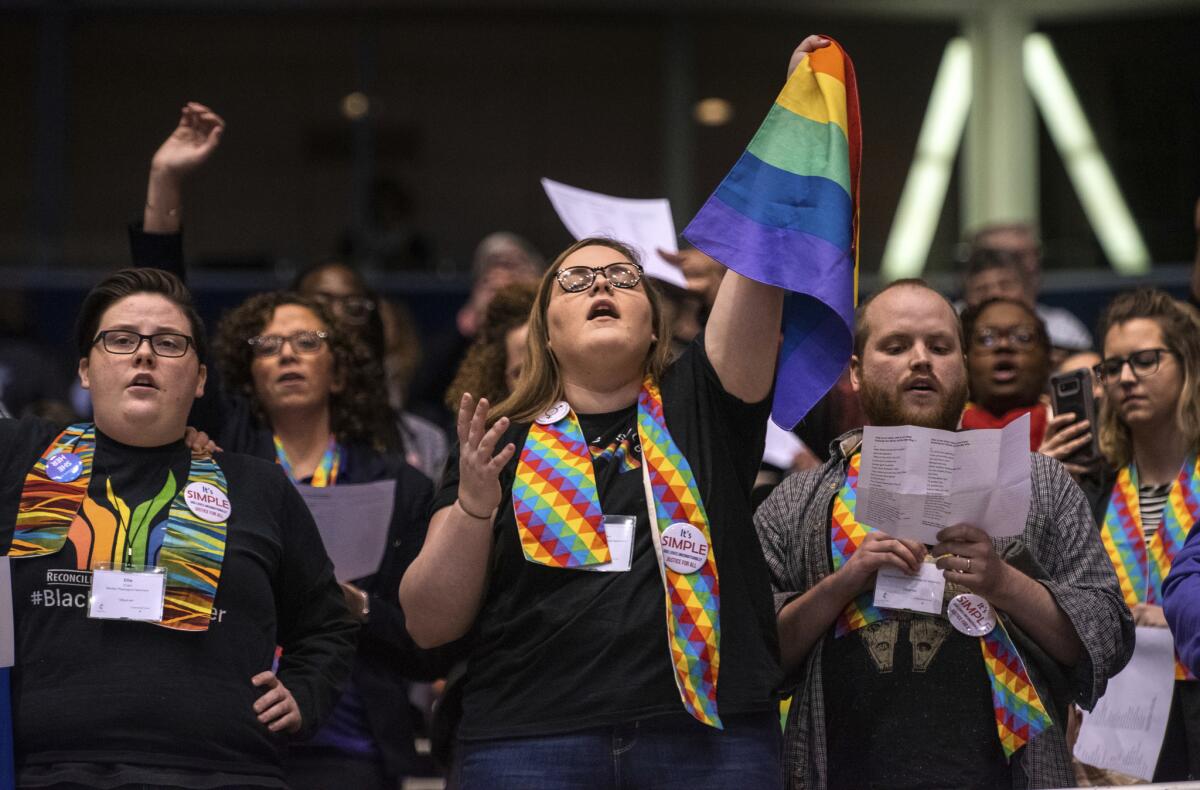Opinion: Religion in the U.S. is too complicated for simple rules like ‘evangelicals support Trump’

- Share via
A South Florida megachurch with a largely Hispanic congregation will host the first Evangelicals for Trump rally Friday.
You’d think the high-fanfare visit of President Trump, who is a big favorite of the church’s pastor, would delight the congregants. Instead, some members of El Rey Jesús church are afraid.
Guillermo Maldonado, the pastor, who is known for speaking in tongues and performing miracles, summarized their worries during a sermon on Sunday, describing a congregant who asked: “How can you bring Trump to church if there’s people who don’t have papers?”
Though Maldonado reassured undocumented church members that Trump wouldn’t deport them, it remains to be seen how many will risk showing up for the rally.
The contrasting perceptions of Trump at the church throw into relief a prevailing falsehood, beloved of Trump and his critics alike: that evangelicals are a monolith, and that that they are collectively in lockstep with Trump.
This is just untrue.
Christians, even evangelicals at a church hand-selected by the Trump reelection campaign, can hold political views that vary widely and fluctuate often.
Nothing is permanent in American religious belief, politics or practice. And studies of how “evangelicals” or “Christians” voted need close scrutiny.
Take the oft-cited findings by Pew Research Center about how people of differing religions voted in 2016. Some 58% of self-reported Protestants, according to Pew’s analysis, voted for Trump. But among those who identified as “white, born-again/evangelical Christians” the portion of Trump voters rose to 81%.
It’s possible that someone who signs on to such a thin-sliced demographic recognizes that they are signing on to Trumpism along with their religious beliefs. “White born-again/evangelical Christians support Trump” might be a tautology, like “atheists don’t believe in God.”
But in America, “What’s your religion?” has never been a multiple-choice question. Our answers are essays.
My mother was Catholic, but left after Vatican II. My father was a staunch atheist, but agreed to baptize us to appease his evangelical Methodist parents. I am a Vaishnava practitioner but go to Conservative synagogue with my wife, though she wants to change synagogues because she disagrees with our rabbi about Israel.
Sometimes it seems the American religion just is flux. Our answers are robust and sometimes high-drama stories about families, conflict, history, fears, hopes and— invariably — politics.
What’s more, when a religious sect is seen by adherents as having become too conservative or too progressive, dissenting members often simply drop it, and invent something else, Pilgrim-style.
To treat religious identity as fixed is not only to raze the nuances of our individual stories, but also to warp our understanding of — and compassion for — our fellow Americans.
Which is why it’s worth paying attention to what’s happening in broad daylight with evangelicals, who are said to make up a quarter of the American population. Talk about flux.
In 2016, Mark Demoss, a prominent board member at and donor to Liberty University, resigned when President Jerry Falwell Jr. came out hard for Trump. Students started Liberty United Against Trump. And a reported 500 Liberty University alumni pledged to return their diplomas to protest Falwell’s support of Trump.
In 2017, Falwell banned Christian author Jonathan Martin from Liberty’s campus after he went there to protest Falwell’s political stances. Speaking of Falwell’s Trumpist doctrine, Martin said in an NPR interview, “It often feels to me like a whole new religion.”
In 2018, Vice President Mike Pence found himself greeted by protests at the Southern Baptist Convention, the biggest evangelical group in the nation. Then, in May, dozens walked out when Pence arrived to give the commencement address at Taylor University, an evangelical institution in Indiana. Evangelicals walking out on Pence, in Indiana, where he was governor?
This would be like folks walking out on former Vice President Dick Cheney if he spoke at an NRA convention in Wyoming.
And most recently we have an editorial advocating Trump’s removal from office in Christianity Today, a key publication for evangelicals. The Dec. 19 piece denounced Trump as “immoral” and led to some 600 canceled subscriptions. But the magazine gained 1,800 subscribers, according to editor Mark Galli.
As evangelicals, by that name, have increasingly styled themselves as a political group aligned with Trumpism, individual worshipers, evangelical churches and even prominent evangelical leadership have been forced to evolve.
American religions come to such turning points all the time. Maybe some churches will disassociate from the evangelical label because of its ideological implications.
Or maybe, as happens so often in American faith, something entirely new will be born.
Twitter: @page88
More to Read
A cure for the common opinion
Get thought-provoking perspectives with our weekly newsletter.
You may occasionally receive promotional content from the Los Angeles Times.








